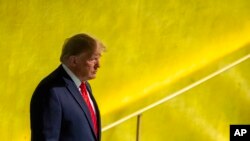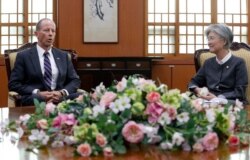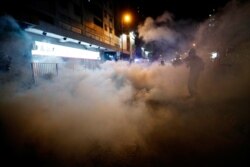Libo Liu and Suli Yi from VOA Mandarin service contributed to this report.
President Donald Trump says the United States is "carefully monitoring" the situation in Hong Kong, where tensions are high ahead of Beijing's planned ceremonies marking 70 years of Communist Party rule next week.
Trump told the United Nations General Assembly Tuesday, "the world fully expects that the Chinese government will honor its binding treaty made with the British and registered with the United Nations in which China commits to protect Hong Kong's freedom, legal system and democratic ways of life."
Ahead of the Oct. 1 event, Chinese authorities are eager to prevent Hong Kong's pro-democracy protesters from creating a spectacle after months of street demonstrations and clashes with police.
A senior State Department official recently told American lawmakers that the U.S. worries about a repeat of the violent crackdown against protesters in Beijing's Tiananmen Square on June 4, 1989.
"[What] we were most concerned about was a 1989 reenactment," said State Department's Assistant Secretary for East Asian and Pacific Affairs David Stilwell last Wednesday.
Beijing residents are seeing some of the heaviest security ever as troops conduct rehearsals for military parades and anniversary events.
US bills support HK protesters
Congress may vote as early as next week on two proposed bills that include measures to deter a Chinese crackdown in Hong Kong. Both bills already show they have broad support despite deep partisan divisions among lawmakers on a wide range of other issues.
The "Hong Kong Human Rights and Democracy Act" could impose sanctions on those responsible for rights abuses, request that Hong Kongers who are detained for protesting not be denied U.S. visas, and would require the administration to produce reports on the status of human rights and rule of law.
Another bill, the "Protect Hong Kong Act" would prohibit the sales of nonlethal crowd control items, such as tear gas, to the Hong Kong police force that has been accused of abuses against protesters.
US-Hong Kong autonomy policy
Under the 1992 U.S.-Hong Kong Policy Act, the U.S. supports Hong Kong's high degree of autonomy under the so-called "One Country, Two Systems" framework after China resumed control over Hong Kong from the British colonial rule on July 1, 1997.
The U.S. law followed the signature of the 1984 Sino-British Joint Declaration, which the Chinese government had lobbied hard for international support, Hong Kong pro-democracy leader Martin Lee recalled.
"It's only their agreement but they wanted the free world to support it. Why? Because they were afraid that if Hong Kong people were to lose confidence in the agreement, and therefore in the future [after the 1997 transition] they would all leave Hong Kong. The able, the professional people, the people with money, would all leave Hong Kong," Lee told VOA Mandarin in an interview.
China calls out US meddling
Beijing said Washington is meddling China's domestic affairs.
"The (U.S.) should stop all forms of interference in Hong Kong's affairs, stop promoting the review of relevant Hong Kong-related motions," said Chinese Foreign Ministry Spokesman Geng Shuang.
"Stop contributing to the words and actions that undermine the prosperity and stability of the Hong Kong Special Administrative Region, and adding further flames to the fire," added Geng during a recent briefing.
American officials categorically denied Beijing's assertion that blamed Washington has been the "black hand" behind the protests.
"China has provided no evidence of a "black hand" behind the protests in Hong Kong, because it doesn't exist. Hong Kongers took to the streets because Beijing is undermining its own "One Country, Two Systems" framework," said Assistant Secretary of State Stilwell.






